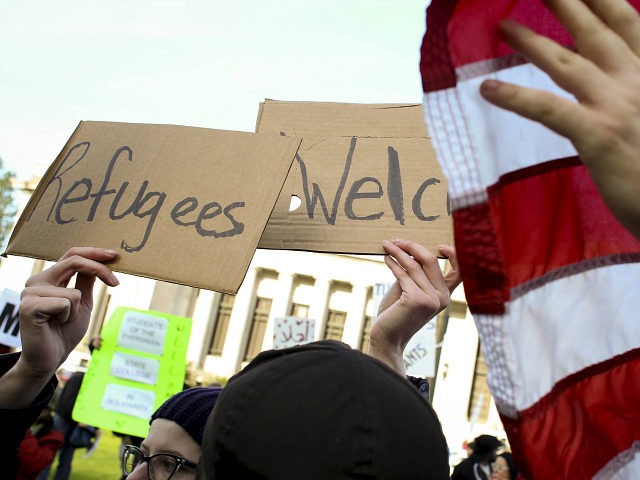The New York Times is reporting that the State Department will nearly double the rate of refugee admissions to the United States for the balance of FY 2017, from the current rate of 830 per week to 1,500 per week.
“Despite repeated efforts by President Trump to curtail refugee resettlements, the State Department this week quietly lifted the department’s restriction on the number of refugees allowed to enter the United States,” the Times reported on Friday.
The result could be a near doubling of refugees entering the country, from about 830 people a week in the first three weeks of this month to well over 1,500 people per week by next month, according to refugee advocates. Tens of thousands of refugees are waiting to come to the United States.
The State Department’s decision was conveyed in an email on Thursday to the private agencies in countries around the world that help refugees manage the nearly two-year application process needed to enter the United States.
In her email, Jennifer L. Smith, a department official, wrote that the refugee groups could begin bringing people to the United States “unconstrained by the weekly quotas that were in place.”
It is unclear if the State Department made this upward adjustment with the knowledge and approval of President Trump. The Department of Justice, however, was apparently consulted.
“A State Department spokeswoman, speaking on the condition of anonymity because she was not authorized to discuss the issue publicly, said the department had consulted the Department of Justice about its refugee quotas and had decided to adjust them,” the Times reported.
As of May 24, 45,533 refugees have been admitted to the United States in FY 2017, which began on October 1, 2016. Earlier this week, Breitbart News estimated that if the refugee entry rate continued at the level of 817 per week (the rate of the four most recent weeks), the total number of refugees admitted to the United States in FY 2017 by September 30 would be 60,672.
If the rate of refugee admission continues at the 1,500 per week level reported by the Times for the remaining 18 weeks of FY 2017, the total number of refugees admitted in the United States during FY 2017 will be 72,996.
In FY 2016, the last full year of the Obama administration, 84,995 refugees were resettled in the United States.
“Before FY 2016, the number of refugees resettled in the United States under the Obama administration declined from 74,649 in FY 2009 to 56,424 in FY 2011, then increased to 69,933 in FY 2015,” Breitbart News reported. During the George W. Bush administration, the number of refugees admitted into the United States annually “ranged from a low of 28,390 in FY 2003 to a high of 60,191 in FY 2008.”
Opponents of the federal refugee resettlement program vigorously criticized the reported change in the Trump administration’s refugee admissions policy for FY 2017.
“Stunning news: Trump State Department opens the flood gates, refugee admissions will explode in coming weeks,” Ann Corcoran wrote at Refugee Resettlement Watch on Saturday.
“Betraying the voters who elected Donald Trump, the Department of State slipped the news to the contractors on Thursday who then slipped the news to the New York Times just as you were packing up for the beach or getting ready for a family barbecue using the federal government’s favorite holiday weekend trick to bury the news,” Corcoran added.
In contrast, the voluntary agencies [VOLAGs] who are paid by taxpayers more than $1 billion annually to resettled refugees under the program praised the State Department’s decision, but also want more in FY 2018.
“Refugee advocates were delighted by the State Department’s decision,” the Times reported:
“This is long overdue, but we’re very happy,” said Mark Hetfield, president and chief executive of HIAS, an immigrant aid society.
But many of the advocates said they were worried that any reprieve would be temporary.
“The president’s proposed budget cuts for 2018 would mean we would have a much smaller program next year no matter what happens with his executive orders,” said Erol Kekic, executive director of the immigration and refugee program at Church World Service.
“The budget submitted to Congress by the Trump administration on Monday for Fiscal Year (FY) 2018 cuts refugee resettlement funding significantly in the State Department and the Department of Health and Human Services, the two departments with primary responsibility for the federal program’s implementation and management,” Breitbart News reported earlier this week:
The U.S. Refugee Admissions Program category of the State Department’s “Migration and Refugee Assistance” account, which is administered by the Bureau of Population, Refugees, and Migration and “funds overseas processing, transportation, and initial placement for refugees and certain other categories of special immigrants resettling in the United States,” is cut by 11 percent from $450 million in FY 2017 (estimated) to $390 million in FY 2018.
Similarly, the “Refugee and Entrant Assistance” account within the Department of Health and Human Services, which is administered by the Office of Refugee Resettlement and funds “time-limited cash benefits and numerous non-cash Federal benefits, including food assistance through SNAP, medical care, and education,” is cut by 31 percent, from $695 million in FY 2017 (estimated) to $479 million in the fiscal year that begins on October 1.
Congress, however, may decide to restore these cuts in refugee resettlement funding. The VOLAGs are actively lobbying Congress to increase refugee resettlement funding in the FY 2018 budget to a level that will support the resettlement of at least 75,000 refugees during the year.
The Daily Caller reported recently that the Trump administration budget for FY 2018 would support the resettlement of 50,000 refugees per year.
The Bureau of Population, Refugees and Migration, the administrative part of the State Department that manages the inflow of refugees to the United States, continues to be run by holdovers from the Obama administration.

COMMENTS
Please let us know if you're having issues with commenting.